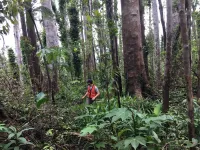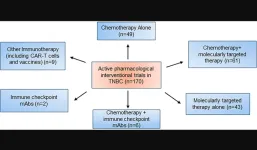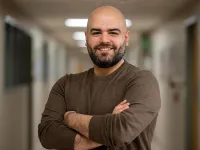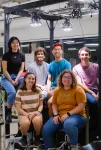(Press-News.org) Adoptive cell therapy (ACT) has become a promising immunotherapy tool to help treat advanced melanoma. The therapy, which harnesses immune cells collected from the patient’s own tumors, could provide a new treatment option to cancer patients, potentially bypassing radiation therapies and harsh chemotherapy drugs.
For the first time, Northwestern University scientists have discovered it is possible to isolate a tumor’s attack cells non-invasively from blood, rather than from tumors. The finding opens the door for ACT to treat harder-to-reach cancer types and makes it a more viable option for hospitals.
“We started asking questions about whether the immune cells that go into tumors come back out, and if you could find them in the bloodstream,” said Shana O. Kelley, the paper’s corresponding author. “We didn't know if we’d be able to find them or if we could see enough of them to even study them. Sure enough, they’re in the blood. This is the first time these cells have been studied in this context.”
Kelley is the Neena B. Schwartz Professor of Chemistry and Biomedical Engineering at the Northwestern University Weinberg College of Arts and Sciences and McCormick School of Engineering, and a professor of biochemistry and molecular genetics at Northwestern University Feinberg School of Medicine. She also is president of the Chan Zuckerberg Biohub Chicago.
The study, published today in the journal Nature Biomedical Engineering, builds on previous work from Kelley’s lab that was published last year in the same journal. In the previous study, Kelley and her team treated mice with their own immune cells gathered from a mass, which dramatically shrunk their tumors, compared to traditional cell-therapy methods.
The 2022 paper also detailed the novel method used to isolate and multiply tumor-infiltrating lymphocytes (TILs), a process that efficiently sorts through and harvests cells to recover 400% more than current approaches, ultimately making the anti-cancer response stronger.
Into the tumor and then out again
By removing and processing melanoma tumors, scientists have found TILs within them. But sometimes removing tumors to harvest TILs can pose significant risks to patients, leaving no path to harness ACT to fight many types of cancer.
Kelley wondered if TILs might exist elsewhere in the body — outside tumors.
After finding TIL-like lymphocytes — or circulating tumor-reactive lymphocytes (cTRLs) — in animal blood, the team tested whether or not cTRLs had the same ability as TILs to kill tumor cells. Surprisingly, they did.
Across tumor cell types and animal models
To overcome another major stumbling point, after finding and profiling cTRLs, the Kelley lab used its novel technology platform to isolate and then replicate only the best tumor fighters.
Again, cTRLs effectively leveled their competition by engaging in direct, “hand-to-hand” combat with tumor cells.
“Engineering-based tools allow you to do things that open up new areas of biology,” said Shana O. Kelley, the paper’s corresponding author. “We could see using the platform at any major medical center, so you could reach a significant number of patients. The platform we use to capture cells is very fast, which brings the cost down, and medical centers are comfortable handling blood.”
Scientists also found cTRLs not just in melanoma models, but in colon, lung and breast cancer, each tumor expressing a unique signature that TILs bind to.
Paving new roads in cell therapy
Kelley has spun out the new technology into health tech startup CTRL Therapeutics, which will petition the U.S. Food and Drug Administration to move the platform into clinical trials.
“This new breakthrough leads us to ask some exciting questions about how early cTRLs appear in blood,” Kelley said. “Could we diagnose and treat cancer earlier using these cells?”
Kelley also is a member of the International Institute for Nanotechnology, the Chemistry of Life Processes Institute, the Simpson Querrey Institute for BioNanotechnology and the Robert H. Lurie Comprehensive Cancer Center of Northwestern University.
The paper’s first author was Zongjie (Daniel) Wang, a University of Toronto professor in the department of electrical and computer engineering. The study, “Non-invasive isolation of tumor-reactive lymphocytes from blood for cancer immunotherapy,” was supported by the Canadian Institutes of Health Research (grant no. FDN-148415) and the Collaborative Health Research Projects program (CIHR/NSERC partnered). This research was supported in part by the McCormick Catalyst Fund at Northwestern University and is part of the University of Toronto’s Medicine by Design initiative, which receives funding from the Canada First Research Excellence Fund.
Kelley has a financial interest in and affiliations with CTRL Therapeutics. Northwestern has financial interests (equities, royalties) in CTRL Therapeutics.
END
New therapy harnesses patients’ blood cells to fight tumors
Noninvasive approach is fast, cost-effective and could be used to treat a variety of cancers
2023-04-10
ELSE PRESS RELEASES FROM THIS DATE:
Prior treatments influence immunotherapy response in advanced melanoma
2023-04-10
Research led by scientists at UCLA Jonsson Comprehensive Cancer Center found that responses to a type of immunotherapy called PD-1 checkpoint blockade in patients with advanced melanoma depended on whether or not they had previously received another immunotherapy – CTLA-4 blockade – as well as other factors.
Their findings, based on analysis of seven data sets generated over the past decade, which included results of tumor biopsies from more than 500 patients, are published in Cancer Cell.
“In our large set of data, features that have been used to predict response ...
Trees in areas prone to hurricanes have strong ability to survive even after severe damage
2023-04-10
As their plane flew low on its approach to land at the airport on the island of Dominica, researchers from Clemson and Harvard universities looked out the window to see miles of forests with trees that looked like matchsticks.
It was nine months after the island in the West Indies had taken a direct hit from Category 5 Hurricane Maria.
But when the researchers actually got into the forests and examined the trees more closely, they discovered that while 89% of the trees sustained damage — 76% of which had major damage —only 10% were immediately killed. Many of the trees had resprouted.
“These ...
Roundtable on community engagement in data decision-making
2023-04-10
A Roundtable Discussion was recently held to discuss the importance of community voice in developing 21st century public health systems. Expert panelists emphasized the need to redefine measures, foster new ideas, and work to ensure that historically excluded populations are represented in the data collection process. The Roundtable transcript is now published in the peer-reviewed journal Big Data. Click here to read the transcript.
The discussion was moderated by Michael Crawford, Associate Dean for Strategy, ...
Temperature is stronger than light and flow as driver of oxygen in US rivers
2023-04-10
UNIVERSITY PARK, Pa. — The amount of dissolved oxygen in a river is a matter of life or death for the plants and animals living within it, but this oxygen concentration varies drastically from one river to another, depending on their unique temperature, light and flow. To better understand which factor has the greatest impact on the concentration of dissolved oxygen, researchers at Penn State used a deep learning model to analyze data from hundreds of rivers across the United States.
Oxygen concentration is an important measure of water quality because fish and other aquatic organisms require dissolved oxygen to breathe, according to Wei Zhi, assistant ...
Crosstalk between triple negative breast cancer and microenvironment
2023-04-10
“[...] the study of immunotherapy for treating triple negative breast cancer might still be at its early stages of development but is full of future promise.”
BUFFALO, NY- April 10, 2023 – A new review paper was published in Oncotarget's Volume 14 on March 31, 2023, entitled, “Crosstalk between triple negative breast cancer and microenvironment.”
Although many advances have been made in the treatment of breast cancer, for triple negative breast cancer (TNBC) these therapies have not significantly increased overall survival. Tumor microenvironment (TME) plays an essential role to develop and control TNBC progression. ...
Fish-inspired, self-charging electric battery may help power space applications
2023-04-10
UNIVERSITY PARK, Pa. — A research lab at Penn State will equally share a three-year, $2.55 million grant from the Air Force Office of Scientific Research (AFOSR) with three other teams at Carnegie Mellon University and the Adolphe Merkle Institute of the University of Fribourg in Switzerland. The multidisciplinary research collaboration aims to develop a framework for the design and production of soft, self-charging, bio-inspired power sources for applications in space.
Joseph Najem, assistant professor of mechanical engineering at Penn State, will lead ...
Rice U. engineering students aim to shed better light on surgeries
2023-04-10
HOUSTON – (April 10, 2023) – Improving lighting in the operating room could cut the duration of some surgeries by as much as 25%, according to Dr. Munish Gupta, an orthopedic spine surgeon at Washington University in St. Louis.
With that in mind, he tasked Rice University engineering students on the OR Lights team — Ellice Gao, Bryn Gerwin, Justin Guilak, Rosemary Lach, Renly Liu and Hemish Thakkar — with building a tunable lighting system that allows surgeons to better illuminate their working ...
Easy and quick binding of targeting molecule and radiotracer to drug nanocarrier for cancer therapy
2023-04-10
BIRMINGHAM, Ala. – An ideal nanovesicle to fight cancer would have three functionalities: 1) a precision-targeting molecule to preferentially bind it to surface markers on cancer cells, 2) a strongly bound radionuclide signal that would allow a PET scan to locate the vesicles in the body, and 3) the ability to carry and release a drug treatment, such as a chemotherapy, at the cancer tumor.
It would also meet two other requirements — having a simple and facile method of manufacture, and being biocompatible and biodegradable in the body.
A University of Alabama at Birmingham team has now described a tiny polymersome that — in initial preclinical ...
SPOILER ALERT: Condolences to the fans of Logan Roy patriarch of HBO’s Succession
2023-04-10
DALLAS, April 10, 2023 — The American Heart Association sends fans of the two-time Emmy Award winning best drama series “Succession” our heartfelt condolences following the sudden cardiac death that killed off main character, Logan Roy, played by Brian Cox.
(SPOILER ALERT) Those who watched last night’s episode on HBO in stunned silence, saw patriarch businessman Logan suffer a cardiac arrest while on a plane as his eldest son, Connor, celebrated his wedding. Logan’s other three children ...
Purdue receives $1 million USDA grants for sustainable agriculture projects
2023-04-10
Purdue receives $1 million USDA grants for sustainable agriculture projects
WEST LAFAYETTE, Ind. — Purdue University has received two grants of $1 million each from the U.S. Department of Agriculture’s National Institute of Food and Agriculture for five-year projects to enhance sustainable agricultural systems.
One grant is part of a $10 million project led by Michigan State University’s Brent Ross to develop more resilient food systems for coping with multiple ...
LAST 30 PRESS RELEASES:
SfN announces Early Career Policy Ambassadors Class of 2026
Spiritual practices strongly associated with reduced risk for hazardous alcohol and drug use
Novel vaccine protects against C. diff disease and recurrence
An “electrical” circadian clock balances growth between shoots and roots
Largest study of rare skin cancer in Mexican patients shows its more complex than previously thought
Colonists dredged away Sydney’s natural oyster reefs. Now science knows how best to restore them.
Joint and independent associations of gestational diabetes and depression with childhood obesity
Spirituality and harmful or hazardous alcohol and other drug use
New plastic material could solve energy storage challenge, researchers report
Mapping protein production in brain cells yields new insights for brain disease
Exposing a hidden anchor for HIV replication
Can Europe be climate-neutral by 2050? New monitor tracks the pace of the energy transition
Major heart attack study reveals ‘survival paradox’: Frail men at higher risk of death than women despite better treatment
Medicare patients get different stroke care depending on plan, analysis reveals
Polyploidy-induced senescence may drive aging, tissue repair, and cancer risk
Study shows that treating patients with lifestyle medicine may help reduce clinician burnout
Experimental and numerical framework for acoustic streaming prediction in mid-air phased arrays
Ancestral motif enables broad DNA binding by NIN, a master regulator of rhizobial symbiosis
Macrophage immune cells need constant reminders to retain memories of prior infections
Ultra-endurance running may accelerate aging and breakdown of red blood cells
Ancient mind-body practice proven to lower blood pressure in clinical trial
SwRI to create advanced Product Lifecycle Management system for the Air Force
Natural selection operates on multiple levels, comprehensive review of scientific studies shows
Developing a national research program on liquid metals for fusion
AI-powered ECG could help guide lifelong heart monitoring for patients with repaired tetralogy of fallot
Global shark bites return to average in 2025, with a smaller proportion in the United States
Millions are unaware of heart risks that don’t start in the heart
What freezing plants in blocks of ice can tell us about the future of Svalbard’s plant communities
A new vascularized tissueoid-on-a-chip model for liver regeneration and transplant rejection
Augmented reality menus may help restaurants attract more customers, improve brand perceptions
[Press-News.org] New therapy harnesses patients’ blood cells to fight tumorsNoninvasive approach is fast, cost-effective and could be used to treat a variety of cancers






